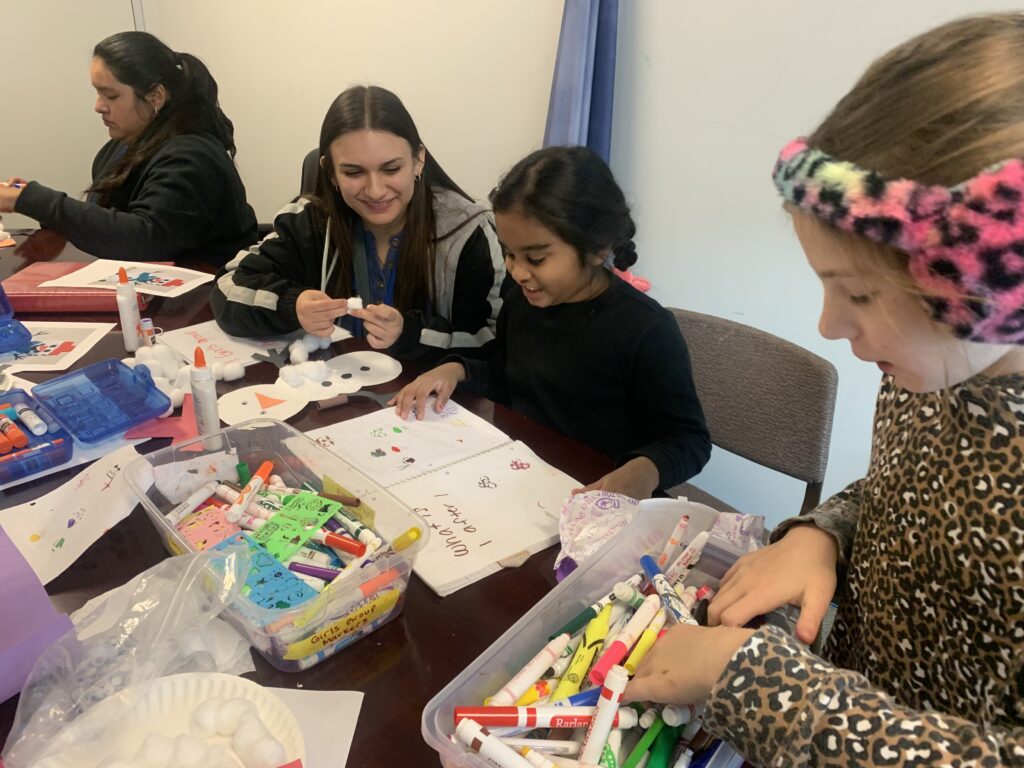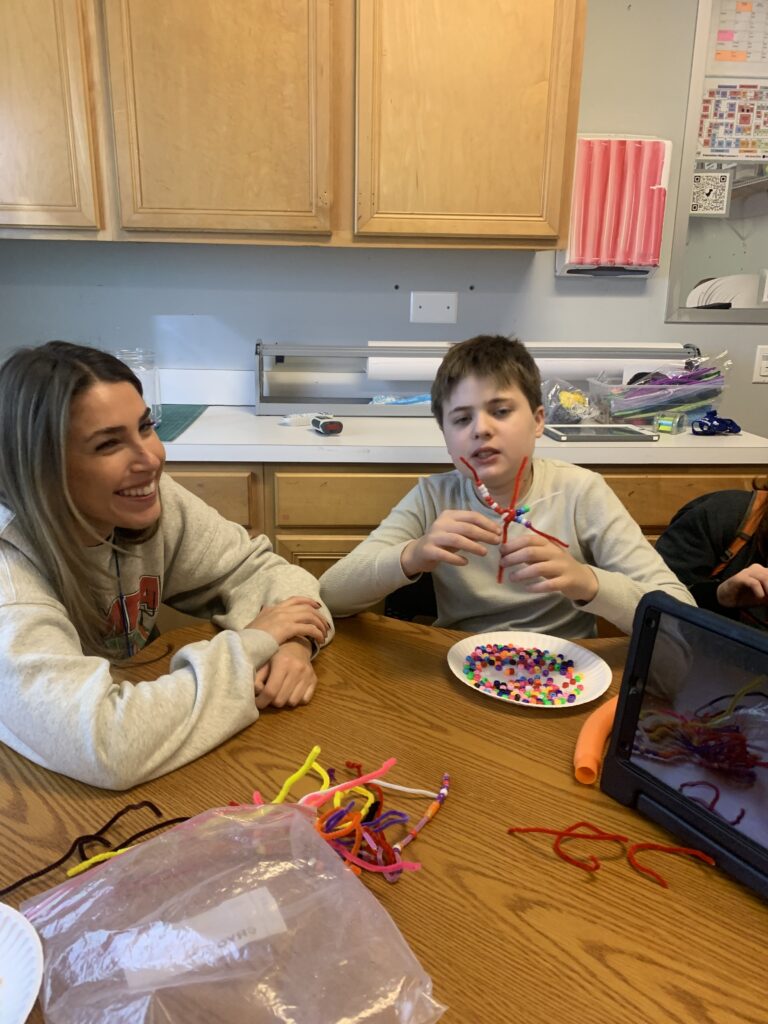Our Program

Soaring Eagle Academy is a unique school for students with disorders in relating and communicating. The founders, all speech and language pathologists, have a collective experience of over 80 years working with children with language disorders. Developmental Language Models have been central in their assessment and intervention of children with disorders in language. Their therapeutic intervention has been built upon the tenets of Developmental Language Models and this experience has provided the framework for Soaring Eagle Academy.
In addition, two of the founders are certified as DIR® Trainers, having extensive experience in the theory, application and training of DIR® and developmental thinking. They have found that the conceptualization of DIR® has been a supportive addition to Developmental Language Models when working with students on the Autism spectrum or with students with disorders in relating and communicating.
The natural integration of contemporary Developmental Language Models and the DIR® (Developmental, Individualized and Relationship-Based) model can help us in our assessment and intervention for children with language delays and disorders of relating and communicating, and is reflected in our curriculum.
Our Educational Plan
Soaring Eagle Academy is a safe, nurturing, social and academic learning environment for students, early childhood ages 5 through 22 years old, with disorders of relating and communicating, that honors and promotes the development of the whole child, by supporting their individual strengths and learning styles while integrating learning and interaction. Soaring Eagle Academy utilizes contemporary Developmental Language Models and principles from the Developmental Individual-Difference, Relationship-Based (DIR®) model, as a framework for assessment and intervention for students with language disorders, autistic spectrum disorders, or disorders of relating and communicating.
Contemporary Developmental Language Models provide a framework for typical language development, defining developmental language milestones and language-based strategies and supports, which facilitates this development for children with language disorders. Applying DIR® thinking to development provides further support for children with language challenges and difficulties in relating and communicating.
The DIR® methodology was developed over 45 years ago by Stanley Greenspan, M.D. and Serena Wieder, PhD and is best understood as this:
Developmental refers to a sequence of milestones that a child moves through as they develop the ability to remain calm, attentive, focused and engaged for communicating, problem solving, thinking and learning.
Individual differences describe how each child takes in and processes sensory information in their environment through their eyes, ears, muscles and body as they move through their day.
Relationships with both peers and adults are the foundation for creating interaction and learning.
Building healthy relationships and social interaction is the cornerstone of the educational program. Each student has an individualized curriculum that integrates his or her own natural interests, developmental level, therapeutic goals and Illinois Learning Standards. Learning experiences support sensory motor, auditory and visual spatial skill development in addition to academics.
Soaring Eagle Academy believes that children learn best when they are well-regulated, able to share attention with their communicative partner and emotionally invested in the learning. Multi-sensory experiences lead to meaningful learning, which in turn creates increased comprehension of material and regulation in students.
Soaring Eagle Academy serves student’s age 5-22 in nine classrooms including three Primary classrooms, two Intermediate classrooms, two High School classrooms, and two Transition classrooms. The special education diagnoses of the students may include Autism, Other Health Impairment, Cognitive Disability, Traumatic Brain Injury, Multiple Disability and Developmental Delay.
The Academy staff is a comprehensive team of certified professionals with initial and on-going weekly training in the methodology utilized and educational best practices. Each student’s team consists of a Special Education Teacher, one-to-one Teacher Assistant, Program Assistant, Speech-Language Pathologist, Occupational Therapist, Social Worker/Mental Health Counselor, DIR® Specialist and Code Blue Crisis Responder, based on their IEP and the Academy’s assessment and therapeutic plan. Fine Arts (music, art) and P.E. are part of a student’s therapeutic plan. The Principal and DIR® expert clinicians work collaboratively to oversee the educational and social program for each student in accordance with the Academy’s philosophy of integrating developmental language model and DIR® principles.
A one-to-one Teacher Assistant, is specifically matched with a student based on that student’s individual profile, and is a critical component of the Academy’s program and the “heart” of the DIR® Model. The Teacher Assistant will take direction from the classroom teacher, support staff and expert clinicians and will serve as the student’s “floortime player” throughout their day, attuning to the child’s individual learning profile, supporting their comprehension and regulation, while naturally wooing them into engagement, interaction and learning.
At the Academy, we utilize a range of research-based curriculum materials tied to the Common Core and Illinois Learning Standards, integrated principles of developmental thinking and language models, to support each student’s learning according to their developmental levels within academic areas of literacy, math, science and social studies. A variety of equipment and educational software programs are implemented to support the curriculum by providing visual, auditory, social/emotional, language comprehension and organizational supports to allow optimal success. Curriculum is adapted to each student’s interests, developmental levels, and academic and therapeutic goals. We believe that all students have the right to access a rich academic curriculum appropriate to their individual learning style and developmental levels, while also supporting functional life skills and vocational job skills.
The Transition Program prepares our 18-22 year old students as they transition out of their school years, and into adulthood. Through the collaborative efforts of a team of educators and therapists, we work with each student and his/her parents, to develop realistic post-school goals, and plan how best to impart the skills and strategies necessary to enable the student to be as independent as possible with optimal quality of life, facilitating the process of self-regulation while teaching functional skills. In accordance with IDEA requirements, the program addresses the five components of transition planning – education/vocational training, employment, independent living, recreation/leisure, and community integration.
All activities are presented in a dynamic and meaningful way, driven by student interests, personal strengths and developmental levels/capacities. This facilitates high interest and participation and ensures carryover of newly learned classroom skills to students’ everyday life. We are committed to providing students with a safe, nurturing and individualized environment in which they can learn how to integrate into their communities. Our approach in teaching through a relationship-based model allows for students to connect and make meaning of the life skills being taught through academics, daily living tasks, vocational training, and rec/leisure experiences. Program activities take place through forming relationships in the community, work sites, and other dynamic locations. We focus on the process and embrace each of our student’s interests, personal strengths and developmental levels/capacities. Program objectives are to produce young adults who can:
- Generalize the ability to stay regulated and socially engaged in “real world” environments.
- Uncover their social, recreational and vocational interests.
- Have increased opportunity for work sites that align with their individual differences.
- Be gainfully employed in a supported work environment.
- Engage in a healthy lifestyle through integrated recreation/leisure activities.
- Effectively utilize daily living skills to function as independently as possible.
- Develop skills and coping strategies required to achieve the highest level of independence and quality of life – a life filled with meaning and purpose, filled with a joy for interacting, forming relationships and ongoing learning.
Family involvement is a central component of the program. Parents are respected as active partners in their child’s education through observation, training, classroom visits and coaching to support parent/child interaction. Through this process parents are supported in understanding their child’s strengths and challenges to bridge the home and school environment.
Soaring Eagle Academy’s behavior policies and procedures promote proactive developmental and emotionally affirming approaches along a continuum of developing their ability regulate him/herself. SEA does not use any behavior intervention strategies that would jeopardize the safety or security of students or that would rely upon pain as a method of control. An “Individualized Regulatory Support Plan” is developed for each student based on his or her sensory profile and regulatory assessment. The (IRSP) is the completion of a complex assessment and resulting intervention Safety Plan when appropriate that is developed and updated regularly and reviewed at a student’s Individualized Educational Plan (IEP) meeting. The purpose of the plan is to expand the staff and parents’ understanding of the student’s regulatory profile in order to decrease stress responses resulting in behaviors and facilitate a calm regulated state throughout a student’s day.


